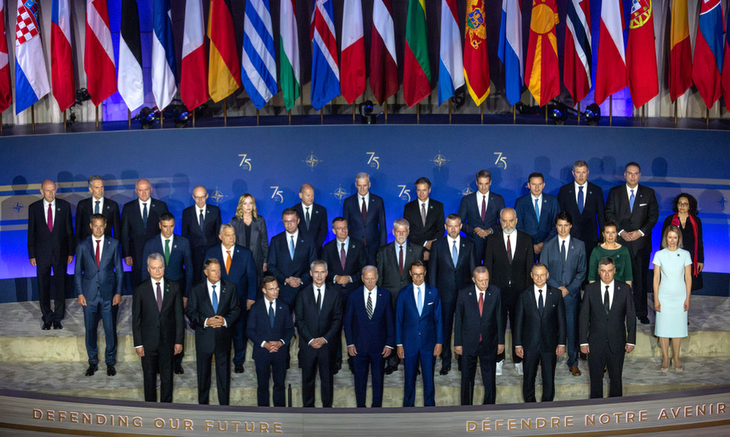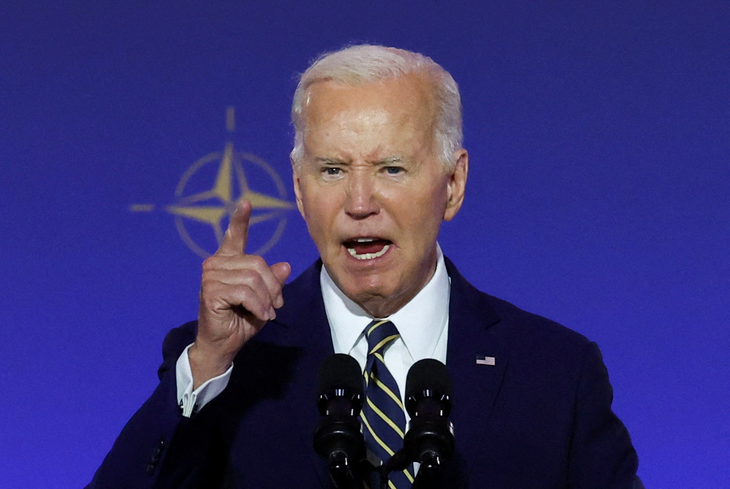(VOVWORLD) - NATO’s 75th Anniversary Summit, held in Washington, D.C, on Tuesday and Wednesday, decided major orientations for its operations in the next three decades.
 NATO leaders take photo at the 75th Anniversary Summit on July 9, 2024. (Photo: NATO) NATO leaders take photo at the 75th Anniversary Summit on July 9, 2024. (Photo: NATO) |
During the two-day Summit, the heads of the 32 NATO countries adopted a Declaration outlining the bloc's new strategic priorities for increasing defense production capacity, bolstering long-term support for Ukraine, and promoting security partnership beyond NATO's traditional geographic boundary.
Further strengthening defence
In a 38-article Washington Summit Declaration, the participants reaffirmed NATO’s role of maintaining security and stability in the Euro-Atlantic region. 23 of the 32 NATO members have spent at least 2% of their GDP on NATO’s common defense effort, a 7-fold increase compared to 2014 when the 2% GDP requirement was first introduced.
NATO will reform its integrated command structure, improve its air defense capability, and set a roadmap to defense production capacity through its Defense Planning Process. This is a very notable decision because, in recent years, under the pressure of the conflicts in Ukraine and Gaza, many NATO members’ weapons reserves have been exhausted.
 US President Joe Biden speaks at NATO's 75th Anniversary Summit. US President Joe Biden speaks at NATO's 75th Anniversary Summit. |
US President Joe Biden said: “For the first time, every NATO member is pledging to develop plans for domestic defense production. That means, as an alliance, we’ll become more innovative and competitive – and we’re able to produce more critical defense equipment more quickly.”
The Summit spent a lot of time discussing the Ukraine situation. It issued a commitment of long-term assistance to Ukraine, including an aid package of at least 40 billion USD next year, the establishment of a NATO Security Assistance and Training Center for Ukraine, and investment in Ukraine's infrastructure. It did not provide a specific roadmap or milestones for Ukraine's path to NATO accession.
Jim Townsend, an expert at the Center for a New American Security, said that’s consistent with NATO's current policy of avoiding specific commitments.
"I think they have left the time frame a bit open in terms of when this would happen. They talked about the ends of the war, but but right now I think for this summit, the emphasis is on military assistance and less on a definite time scale or an invitation on beginning of talks. That won't be on the agenda tomorrow."
Political instability in the US
The US’s internal political situation affected the NATO Summit. Responding to an observation that NATO is rushing to implement a number of policies, especially ones related to Ukraine, before the US presidential election later this year, NATO Secretary General Jens Stoltenberg downplayed the significance.
Prior to the Summit, German Foreign Minister Annalena Baerbock said that in the long term Europe needs to play a larger role in NATO to avoid being affected by US political developments.
"No one knows what the coming weeks and months will look like. But what we do know is that, regardless of the election outcome in the US, NATO must be become more European in order to remain trans-Atlantic,” said Baerbock.
Another controversial issue at the Summit was NATO’s expanding influence beyond Europe and North America. For the fourth consecutive year NATO invited the leaders of Japan, South Korea, Australia, and New Zealand to its Summit.
NATO's increased involvement in the Indo-Pacific has raised concerns from some countries about the risk of increased tensions and geopolitical fragmentation in this extremely sensitive region.